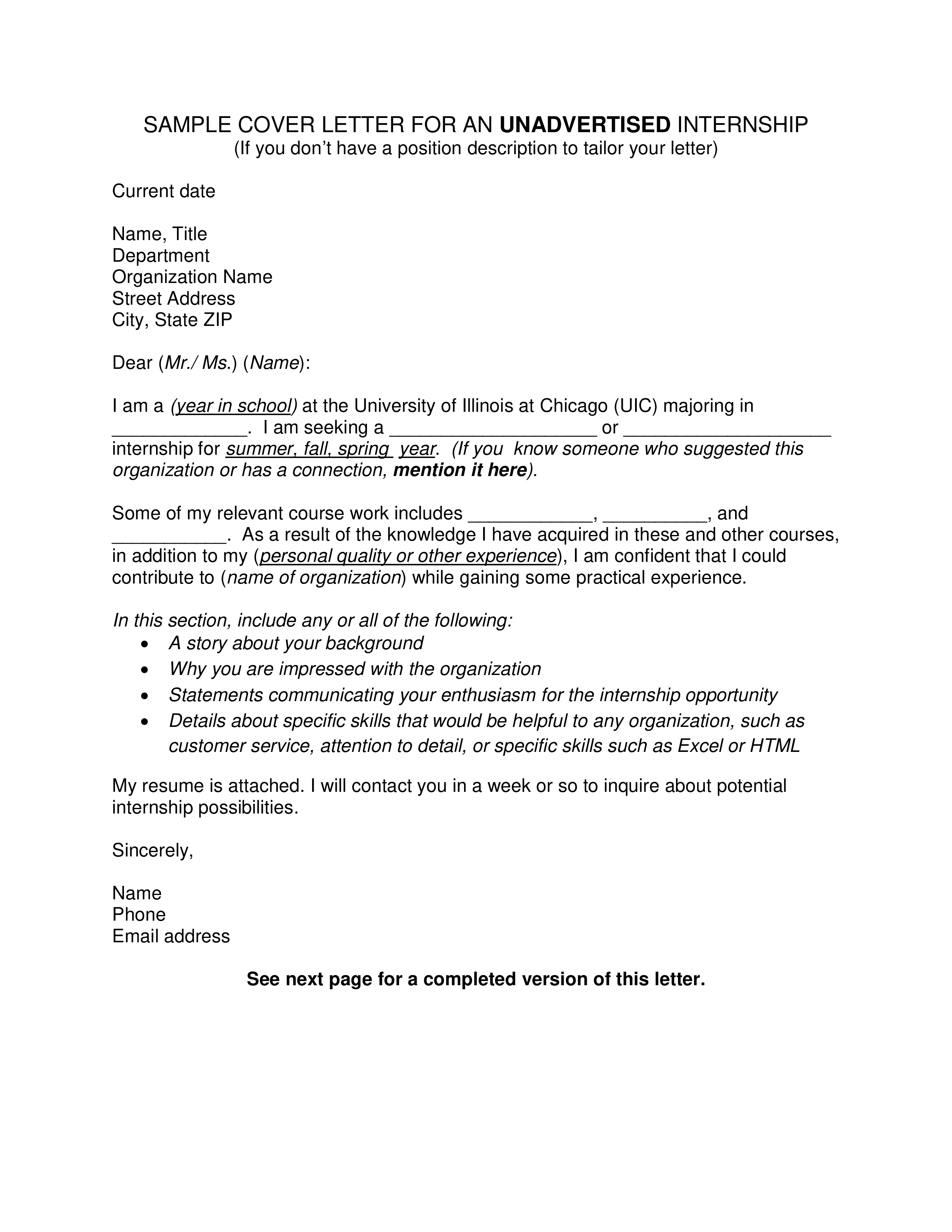Understanding the Internship Cover Letter
A cover letter is a crucial component of your internship application package. It serves as your introduction to a potential employer, providing an opportunity to showcase your personality, express your interest in the specific internship, and highlight the skills and experiences that make you a strong candidate. Unlike a resume, which presents a factual overview of your qualifications, a cover letter allows you to elaborate on your experiences and explain how they align with the internship’s requirements. It also allows you to demonstrate your communication skills and enthusiasm, setting you apart from other applicants. The importance of a well-crafted cover letter cannot be overstated, as it’s often the first impression you make on a hiring manager.
Purpose of an Internship Cover Letter
The primary purpose of an internship cover letter is to persuade the employer to consider your application. It allows you to articulate your career goals, explain why you’re interested in the specific internship and the company, and demonstrate how your skills and experiences align with the role’s requirements. A well-written cover letter can effectively communicate your passion for the field, your understanding of the company’s mission, and your ability to contribute meaningfully to their team. It also provides an opportunity to address any gaps in your resume, such as a lack of direct experience, by explaining how your transferable skills and experiences make you a suitable candidate. Finally, it serves as a means of personalizing your application, showing the employer that you’ve taken the time to understand their needs and tailor your application accordingly.
Key Components of a Successful Internship Cover Letter
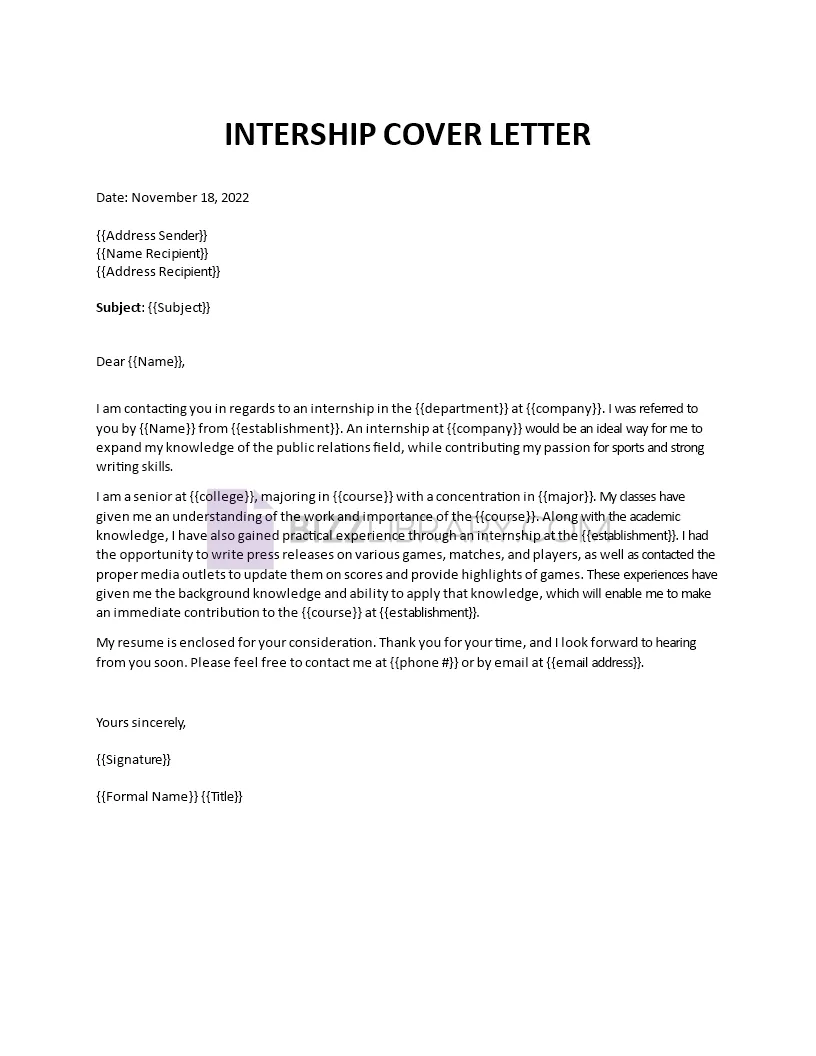
A successful internship cover letter has several key components that work together to create a compelling application. These include a professional header, a concise and engaging opening paragraph, body paragraphs that showcase your relevant skills and experiences, and a strong closing paragraph. Each section plays a crucial role in conveying your suitability for the internship. By mastering these key components, you can significantly increase your chances of securing an interview. The header section includes your contact information, as well as the date and the employer’s contact information. The opening paragraph must capture the reader’s attention and clearly state the position you’re applying for. The body paragraphs should provide specific examples of your skills and experience, while the closing paragraph reiterates your interest and includes a call to action.
Header Section
The header is the first element of your cover letter, and it’s essential to get it right. It should include your full name, address, phone number, and email address. Ensure that your contact information is accurate and up-to-date. This allows the employer to quickly identify you and reach you if they decide to move forward with your application. Following your contact information, include the date. Next, include the employer’s contact information, typically the hiring manager’s name, title, and the company’s address. Addressing the letter to a specific person shows that you’ve done your research and are attentive to detail, which makes a positive impression on the hiring manager. This attention to detail demonstrates your professionalism from the start, and sets a good tone for the rest of the cover letter.
Your Contact Information
Your contact information should be placed at the top of the letter, usually left-aligned. Include your full name, phone number, and a professional email address. Make sure the email address is appropriate, as it reflects your professionalism. The goal is to make it easy for the employer to contact you.
Date
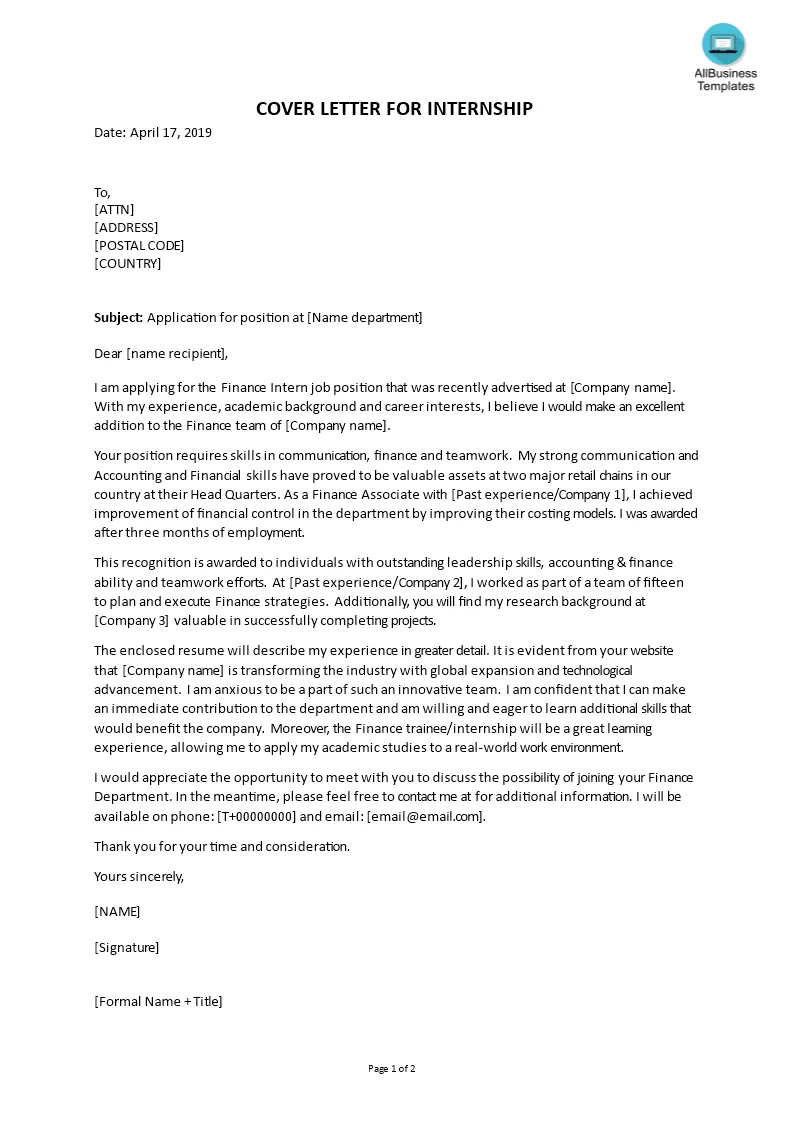
Below your contact information, and sometimes to the right, include the date the letter is written. Use a standard date format (e.g., May 15, 2024).
Employer’s Contact Information
Directly below the date, include the recipient’s information. This should include the hiring manager’s name (if known), their title, the company name, and the company’s address. Address the letter to a specific person whenever possible; it shows that you’ve done your research and increases the personal touch.
Opening Paragraph
The opening paragraph is your chance to make a strong first impression and capture the reader’s attention. It should state the position you’re applying for and how you found out about it. Immediately express your enthusiasm for the internship and the company. Show the reader that you have researched the company and understand their mission or values. A compelling opening immediately grabs the hiring manager’s attention and encourages them to continue reading. Consider starting with a brief statement about why you are excited about the opportunity or mentioning something specific that caught your eye about the company or the internship. This indicates your genuine interest and helps you stand out from other applicants who may use generic openings.
How to Grab Their Attention
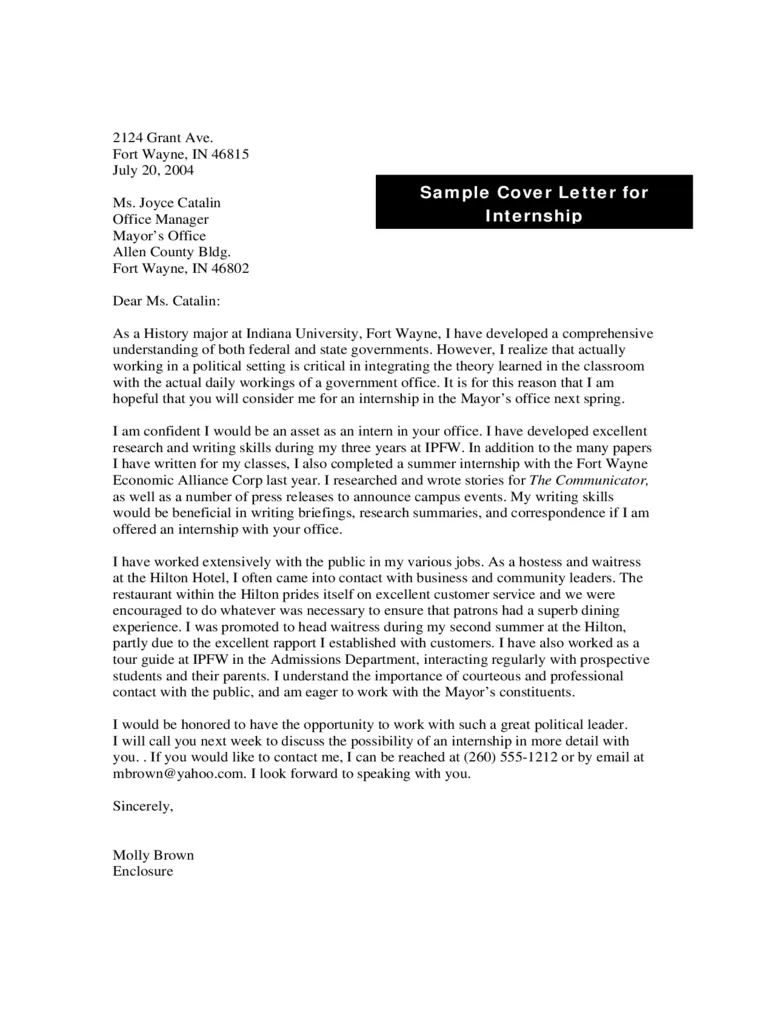
To grab the employer’s attention, start with a strong hook. You can mention a specific achievement, a relevant skill, or your understanding of the company’s mission. Avoid generic opening lines. Instead, show your enthusiasm for the specific internship opportunity. Mentioning something specific that resonates with the company will demonstrate that you have tailored your cover letter and have genuine interest.
Highlighting Your Interest and Passion
Clearly express your interest in the internship and the company’s mission. Show your passion for the field or industry by relating your career goals to the internship. Mention any specific projects or aspects of the internship that excite you. Demonstrating your passion and linking it to your career goals will show the employer that you have long-term interests that go beyond just looking for a job.
Body Paragraphs
The body paragraphs are the core of your cover letter. This is where you demonstrate your skills and experiences, tailor your qualifications to the internship requirements, and quantify your achievements. Focus on relevant experiences and skills. Use specific examples to illustrate your abilities and demonstrate how your experience has prepared you for the role. The body paragraphs should explain how your experience aligns with the internship description. Use the job description as your guide to highlight your skills, tailoring your examples to address the employer’s needs. This will show the employer that you are the right fit.
Showcasing Relevant Skills and Experiences
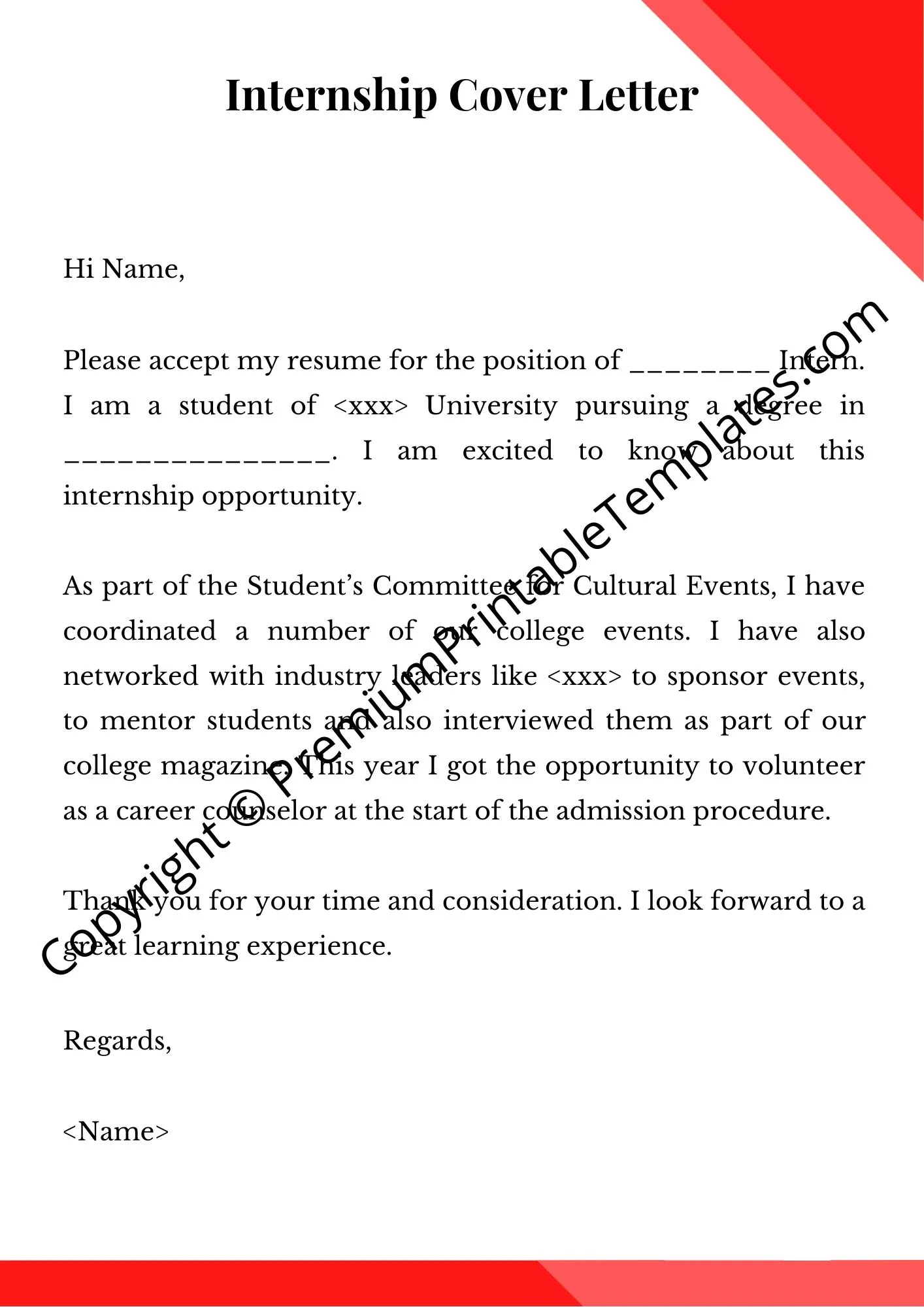
Focus on skills and experiences that align with the internship requirements. Highlight your transferable skills, such as communication, teamwork, problem-solving, and leadership. Provide specific examples of your skills in action and include relevant projects or coursework. Whenever possible, quantify your achievements with data or numbers to make your impact more tangible. For example, if you improved customer service, mention the percentage increase in customer satisfaction.
Tailoring to the Internship Requirements
Carefully review the internship description and identify the key requirements. Tailor your cover letter to address these requirements directly. Provide specific examples from your past experiences that showcase your ability to meet those requirements. This demonstrates that you understand the role and are well-prepared for it. By addressing the requirements point by point, you show the hiring manager that you are a serious candidate who has thoughtfully reviewed the job posting.
Quantifying Your Achievements
Whenever possible, quantify your achievements. Use numbers, percentages, and data to show the impact of your work. Quantifying your accomplishments provides concrete evidence of your skills and abilities. For example, if you improved a process, state the percentage improvement. If you managed a project, mention the budget and the number of people involved. Providing these figures makes your achievements more impressive and helps the employer understand the value you can bring to their team. This attention to detail and ability to demonstrate tangible results will significantly increase your chances of being noticed.
Closing Paragraph
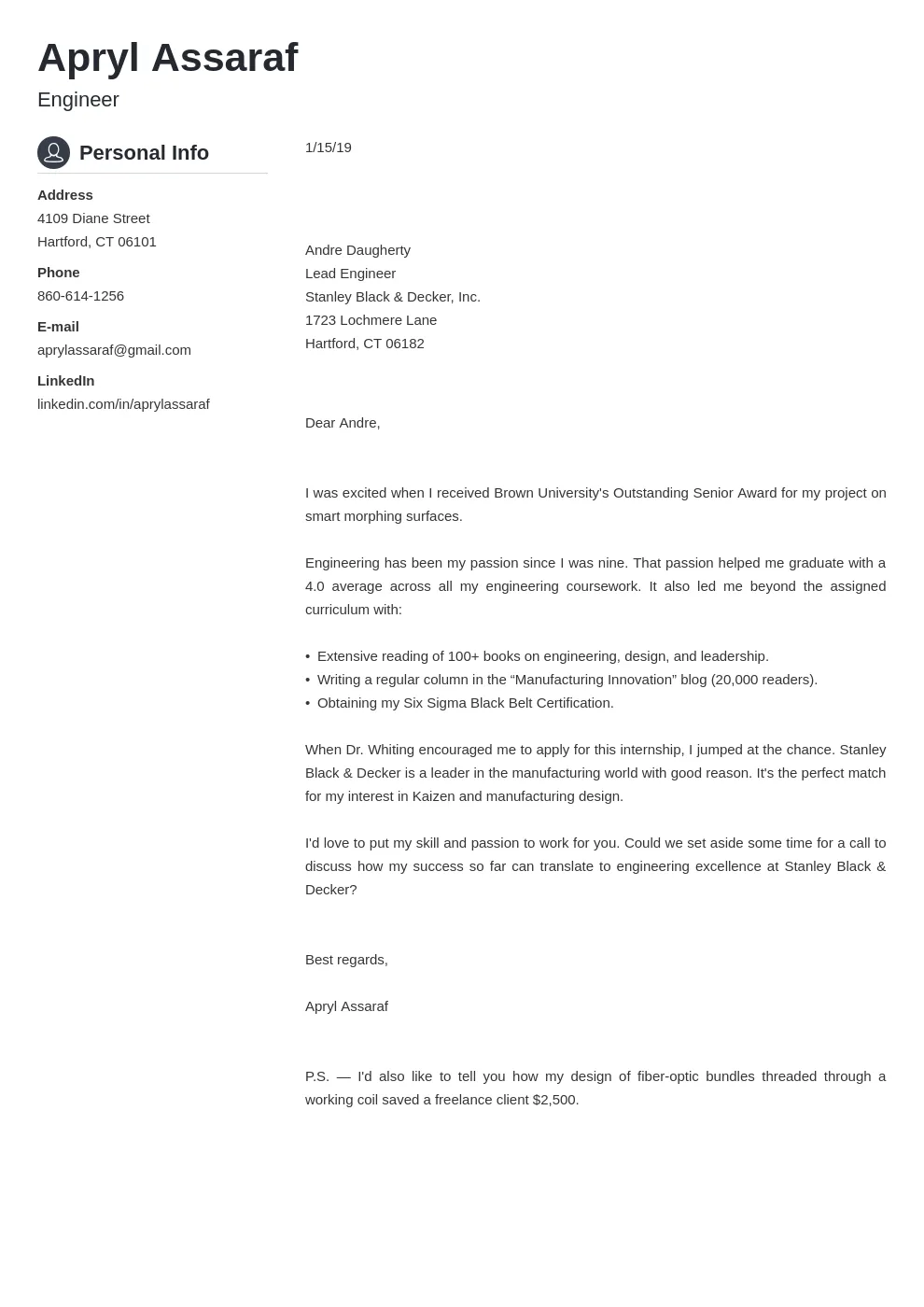
The closing paragraph is your opportunity to reiterate your enthusiasm, summarize your key qualifications, and include a call to action. Express your eagerness to learn more about the internship and reiterate your interest in the company. Ensure that you thank the employer for their time and consideration, and state your next steps. This may involve expressing your availability for an interview or mentioning your follow-up plans. A strong closing paragraph leaves a positive and lasting impression on the hiring manager, increasing the likelihood of further communication.
Expressing Enthusiasm and Next Steps
Reiterate your enthusiasm for the internship opportunity and express your eagerness to learn more. Mention your availability for an interview, and state how you will follow up with the hiring manager. This reinforces your interest and shows your proactive approach. By being proactive in your follow-up, you demonstrate your genuine interest and professionalism. Also, include how you plan to follow up, whether it’s sending a thank-you email or checking in at a specific time.
Call to Action
End with a clear call to action, such as expressing your willingness to be interviewed. Thank the employer for their time and consideration. Include your contact information again or a reference to your resume. A clear call to action encourages the employer to take the next step and contact you, increasing your chances of securing an interview. Keep the call to action concise and straightforward, such as “I am eager to discuss my qualifications further and welcome the opportunity to speak with you.”
Formatting and Style
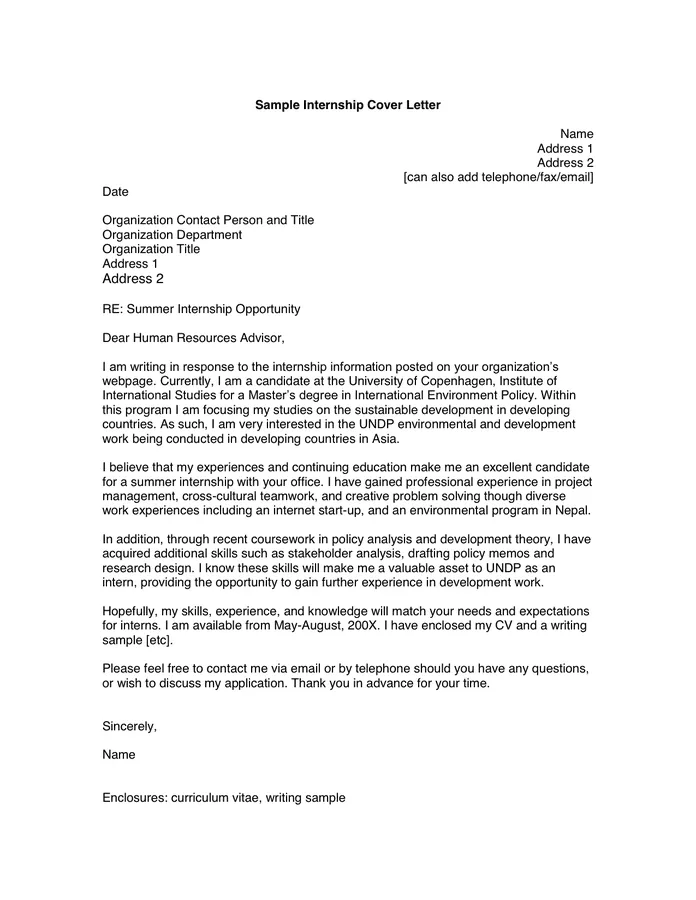
Formatting and style play a crucial role in making your cover letter easy to read and visually appealing. Proper formatting ensures that the information is presented in a clear, organized manner. Maintain a professional tone and use language that is appropriate for the industry and role. Ensure that your writing style is clear, concise, and engaging. Proofread and edit your letter to eliminate any errors in grammar and spelling, and aim for a professional look that reflects your attention to detail. These aspects contribute to your overall impression, and help to make your cover letter stand out.
Choosing the Right Font and Size
Select a professional font, such as Times New Roman, Arial, or Calibri, and keep the font size between 11 and 12 points. Avoid using overly decorative fonts that can be difficult to read. Choose a font that is universally readable and allows the employer to easily scan your letter. Maintain consistency throughout your cover letter to ensure a polished look.
Proofreading and Editing
Proofread your cover letter carefully to eliminate any typos, grammatical errors, or punctuation mistakes. Ensure that the letter flows logically and that the language is clear and concise. Use a grammar checker to identify and correct any errors that may have slipped through. Having a second pair of eyes can be beneficial. Ask a friend, career counselor, or family member to review your cover letter. They can catch errors that you might have missed, and can also provide constructive feedback on clarity, organization, and tone. Take your time and make sure the final version is error-free. This attention to detail shows your professionalism.
Common Mistakes to Avoid
Avoiding common mistakes is essential to make a positive impression. These include generic cover letters, typos and grammatical errors, and failing to address the job description. Being aware of these pitfalls can help you avoid common errors and make your cover letter stand out for the right reasons. By paying attention to these points, you demonstrate your professionalism and commitment to the internship.
Generic Cover Letters
Avoid sending a generic cover letter that is not tailored to the specific internship. Customize each cover letter to the specific requirements of the internship and the company. Show the employer that you have researched the company and understand their values and mission. Sending a generic letter shows a lack of interest and effort. Tailoring the letter for each position and company helps to show the reader that you are genuinely interested in that particular opportunity and are willing to put in the work to succeed.
Typos and Grammatical Errors
Typos and grammatical errors can undermine your credibility. Proofread your cover letter thoroughly to catch any errors. Use a grammar checker, and have a friend or career counselor review your letter for any mistakes. Proofreading is crucial. Mistakes in your cover letter can make it appear unprofessional, and may lead the hiring manager to believe you lack attention to detail. Ensuring that your cover letter is error-free will leave the best possible impression.
Ignoring the Job Description
Carefully read the internship description and tailor your cover letter to match the requirements. Highlight your relevant skills, and provide specific examples to demonstrate your qualifications. Ignoring the job description shows that you are not attentive to detail and have not taken the time to understand the role. Make sure you show how your skills and experience align with the requirements specified in the job description, and address them directly.
Examples of Effective Internship Cover Letters
Reviewing examples of effective internship cover letters can provide valuable insights into how to structure and write your own cover letter. These examples show how to highlight your skills, experiences, and enthusiasm. Analyze successful examples to understand how they address the internship requirements and tailor their message to the specific company. Use these examples as inspiration and a guide for writing your cover letter.
Example 1
An example of a cover letter could highlight a student with strong academic records, specifically mentioning courses relevant to the internship, and include any related projects or coursework. The letter might start by expressing the applicant’s enthusiasm and summarizing their academic achievements. The body could focus on relevant projects, skills, and any related experience such as volunteer work or part-time jobs. This can be closed by expressing interest in the internship and including a call to action.
Example 2
This example highlights a student with specific skills relevant to the internship, such as proficiency in a particular software, data analysis skills, or communication abilities. The applicant can begin by stating their interest and explaining the qualities that attract them to the internship. The body could focus on how the applicant’s skills align with the requirements of the internship and the applicant’s accomplishments. The letter can conclude by reiterating enthusiasm for the internship and making a clear call to action.
Example 3
The third example focuses on a student with previous internship or work experience. The letter might start by expressing the candidate’s enthusiasm and excitement in a particular area. The body could focus on their previous experiences, providing detailed examples of what they learned and accomplished during their prior internships. These examples can showcase how the experience helped them develop skills that are valuable to the current role and include a call to action. This highlights the applicant’s qualifications and demonstrates the applicant’s preparedness for the new internship.
Additional Tips for Your Cover Letter
In addition to the core components, consider these additional tips. These can help you write a cover letter that will stand out. Researching the company, highlighting your unique qualities, and following up after submitting your application will increase your chances of success. Implementing these tips can make your cover letter truly exceptional and maximize your chances of landing your dream internship.
Researching the Company
Research the company to show your genuine interest and tailor your cover letter. Understand their mission, values, and recent projects. Mention specific details about the company, show how they relate to your career goals, and how you can contribute to their team. Your research helps you demonstrate that you are not just applying for any internship, but one with a company you admire. Also, this demonstrates to the hiring manager that you are truly interested in the company and that you have taken the time to get to know them. This research helps you stand out from other candidates.
Highlighting Your Unique Qualities
Highlight your unique qualities and the skills that differentiate you from other applicants. Whether you have a particular skill, experience, or perspective, mention what makes you stand out. Focus on aspects of your background or personality that make you unique and contribute to the position. This will help the hiring manager better understand what you would bring to the internship. This will show the employer that you have something special to offer and that you are more than just a standard applicant.
Following Up After Submitting Your Application
Following up after submitting your application shows initiative and interest. Send a brief thank-you email to the hiring manager within a week or two after submitting your application. You may also consider sending a follow-up email to show your ongoing interest in the internship. This demonstrates your professionalism and shows that you are genuinely interested in the position. Ensure that you follow up with the hiring manager professionally.
